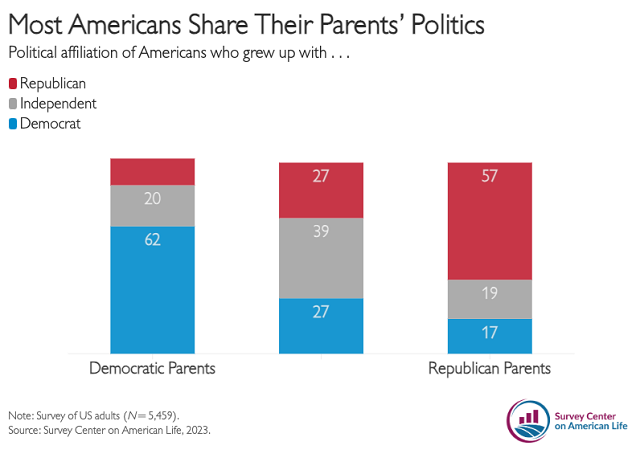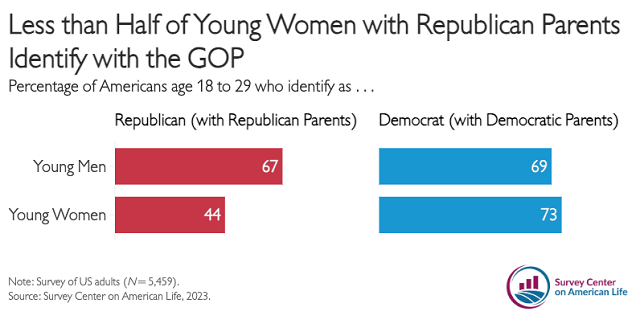Highlights
- I don’t believe it’s a coincidence that young women became much more liberal starting around 2015. Post This
- Young women raised in Republican households are far less likely than young men to identify as Republican as adults. Post This
- More than 7 in 10 young women (73%), and a similar number of young men, who have Democratic parents are themselves Democrats. Post This
Our parents play a critical role in shaping our political perspectives and values. Politically active parents tend to raise children who become lifelong voters, while politically apathetic parents tend to have children who are disinterested in politics. Research has long shown that political beliefs and identity carry forward across generations—a process generally known as political socialization.
But the socialization process works imperfectly. Not every Republican parent has Republican children and vice versa. Family dynamics are complicated, and parents are hardly the only figures who influence their children’s political development.

The people most likely to take on the political identity of their parents are those raised in politically cohesive and active families. Americans raised by parents who consistently voted for one party are far more likely to adopt their parents’ politics. Sixty-two percent of Americans raised by parents who consistently voted Democratic identify as Democrats today, while 57% of those who had Republican-voting parents report being Republican.
When Americans are raised by parents with weaker political attachments, they are less likely to adopt those same affiliations. Less than half (46%) of Americans raised by parents who mostly, but not always, voted for Democrats claim that they are Democrats themselves. The same is true for Republicans. Only 43% of Americans raised by parents who mostly voted Republican are Republicans as adults.
The partisan symmetry of political inheritance is notable. Overall, Democrats and Republican parents pass on their political views with roughly equal effectiveness.
But there’s a critical exception to this rule. Young women raised in Republican households are far less likely than young men to identify as Republican as adults. Less than half (44%) of young women with Republican parents report that they are Republican compared to two-thirds (67%) of young men.

It’s not that young women are less interested in politics or have a distinctive independent streak. If anything, young women are somewhat more politically engaged. A 2015 Pew study found that young women engaged in political discussion with their parents more often than men:
Young women were far more likely than young men to say they most often talk about politics with a parent: 62% of 18- to 29-year-old women who have at least one political discussion partner named a parent, compared with 42% of men the same age, a 20-percentage-point difference.
When young women are raised by Democratic parents, their values strongly align with their family’s politics. More than 7 in 10 young women (73%), and a similar number of young men, who have Democratic parents are themselves Democrats.
In other words, young women reject the partisan commitments of their parents at much higher rates than young men, but only if their parents are Republicans. What might explain this divergence?
LGBTQ Identity
The Republican Party has not been historically welcoming to LGBTQ people, and today more young people than ever identify as LGBTQ. Even as the GOP has become more supportive of same-sex marriage, there remains strong and vocal opposition. In 2023, less than half of Republicans said that marriages between same-sex couples should be recognized as valid. Acceptance of transgender people among Republicans is even lower.
In our polling, nearly one in three Gen Z women identify as LGBTQ, compared to only 15 percent of Gen Z men. Very few LGBTQ people identify as Republican. This is unlikely to change anytime soon as the party continues to oppose many pro-LGBTQ policies. Even if young LGBTQ women have accepting parents, reconciling their personal identity and their parents’ Republican politics is going to be difficult.
The GOP’s position on LGBTQ rights is also potentially alienating to straight young women. Two-thirds of young women—but only about half of young men—have close friends who identify as gay or lesbian. These relationships certainly influence how young people develop their political views.
Abortion
No group of Americans was more immediately impacted by the overturn of Roe v. Wade than young women. The long-held Republican goal was realized after six conservative justices—three of whom were nominated by Republican President Donald Trump—overturned the nearly 50-year-old precedent. The decision was immensely unpopular among young women who have become increasingly supportive of legal abortion. After Roe, the issue of abortion became more politically salient, especially among those who support abortion rights. A survey conducted shortly before the 2022 election found that no issue was more important to young women than abortion. Although a number of conservative lawmakers have started promoting policies that would provide greater assistance to pregnant women, the GOP remains largely focused on restricting abortion where it still exists.
Higher Education
Conservatives have long suspected higher education of indoctrinating their children. The evidence for this is not that compelling, but it's plausible that the liberal culture of college campuses could impact the degree to which young people shed familial political values.
In our survey, college-educated women from Republican families are less likely to remain Republican than those who did not attend a four-year college or university. And the differences are not small. Only 37% of college-educated women raised in Republican households are still Republican as adults, compared to 65% of women with less formal education.
But, if liberal professors, DEI regimes, and gender studies classes are turning women from conservative families into social justice warriors, the impact on men seems muted. Education appears to have very little impact on the politics of men.
A 2014 research paper found that when parents discuss politics regularly at home it encourages their children to become more politically aware and interested in discussing politics, even after they leave home. In The Atlantic, Te-Erika Patterson summarized the paper as follows:
Children who come from homes where politics is a frequent topic of discussion are more likely to talk about politics once they leave home, exposing them to new viewpoints—which they then adopt with surprising frequency.
This research suggests that when conservative parents encourage their children to be politically active, they do so, and their views evolve in the process. It lends some support to the idea that higher education undermines the transmission of conservative values from parents to children.
There’s almost certainly more to it than that. I would argue that the lasting political impact of higher education is what happens to students after they graduate. College graduates tend to gravitate to large cities that have a more liberal political culture. They are more likely to work at jobs or in industries with other college-educated professionals, a group with more left-leaning political views. People do not tend to undergo complete political reversals after reading a single book or sitting through a lecture; rather, attitudes change most dramatically and lastingly when our social context changes.
Donald Trump’s Republican Party
No modern political figure in the GOP has more effectively alienated young women from the Republican Party than Donald Trump. Trump’s frequent disparagement of women, often in deeply personal terms, numerous allegations of sexual misconduct, and infamous “locker room talk” about sexual assault have repelled young women. Seventy percent of young women view Trump unfavorably. And yet he remains the overwhelming favorite for the Republican nomination, if not the presumptive nominee.
This should not be difficult to understand. From the earliest days of Trump’s first presidential campaign, he was deeply unpopular with young women. I don’t believe it’s a coincidence that young women became much more liberal starting around 2015. Trump’s not the only reason for the growing distance between young women and the GOP, but he’s an unignorable one. As long as he is the head of the Republican Party, there is no way for the party to effectively appeal to these voters.
For now, there are few signs that Republican primary voters care much about Trump's alienating behavior. His continued stewardship of the Republican Party is creating lasting divisions that will reverberate across society in foreseeable and unknowable ways.
The breakdown of political socialization is not universal. Parents still have considerable influence over the political trajectory of their children. Rather, young women are primed to reject their parents’ politics when they are raised in Republican families.
Daniel A. Cox is the director and founder of the Survey Center on American Life and a senior fellow in polling and public opinion at the American Enterprise Institute.
Editor's Note: This essay was first published in the author's newsletter, American Storylines. It has been lighly edited and republished here with permission.











